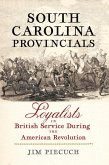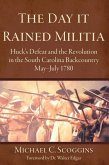On August 19, 1780, near a ford of the Enoree River in northwest South Carolina, a short and savage encounter occurred between Rebel militia and a combined force of Loyalist militia and Provincial regulars. Despite the Rebel's being outnumbered more than two to one, it was an overwhelming victory for the American cause. The Rebels defended from the top of a ridge, inflicted heavy casualties on the Loyalist force as it advanced, then charged and drove the enemy from the field of battle. Just as Bunker Hill had done on a larger scale in Massachusetts, this clash of hundreds of soldiers in the Carolina backwoods invigorated the Rebel cause and led directly to the Battle of King's Mountain, the turning point of the war in the South. This battle is also remarkable because instead of one leader the Rebel force was directed by a joint command of three colonels. The Battle of Musgrove's Mill, 1780, by award-winning historian John Buchanan, begins by describing the situation in South Carolina following the British invasion of 1780 before introducing the three colonels: Isaac Shelby, James Williams, and Elijah Clarke. These men led Rebel militia from North Carolina, South Carolina, and Georgia in an effort to disrupt British operations and their Loyalist support. The colonels and other leaders led mounted Rebel militia in a sweeping and bloody guerilla war that played an essential role in opening a path to the eventual British surrender at Yorktown and Britain's loss of America. Small Battles: Military History as Local History Mark Edward Lender and James Kirby Martin, Series Editors Small Battles offers a fresh and important new perspective on the story of America's early conflicts. It was the small battles, not the clash of major armies, that truly defined the fighting during the colonial wars, the American Revolution, the War of 1812, and the hostilities on the frontiers. This is dramatic military history as seen through the prism of local history--history with a depth of detail, a feeling for place, people, and the impact of battle and its consequences that the story of major battles often cannot convey. The Small Battles series focuses on America's military conflicts at their most intimate and revealing level.
Hinweis: Dieser Artikel kann nur an eine deutsche Lieferadresse ausgeliefert werden.
Hinweis: Dieser Artikel kann nur an eine deutsche Lieferadresse ausgeliefert werden.








